复合不定代词用法和习题练习
复合不定代词语法及练习(有答案)

复合不定代词语法及练习(有答案)复合不定代词/不定副词语法复合不定代词/不定副词包括:someone。
anyone。
no one。
everyone。
___。
anybody。
nobody。
everybody。
something。
anything。
nothing。
and everything。
它们分别表示某人、任何人、没有人、每个人、某物、任何物、没有物、每个物、某地、任何地方、没有地方、每个地方。
当复合不定代词做主语时,谓语动词应使用单数形式。
例如:Everyone knows me here.当形容词修饰不定代词时,形容词应放在不定代词后。
例如:There is something new in today’s newspaper.Some以及Some构成的复合不定代词不定副词多用于肯定句、请求的疑问句、建议的疑问句、否定疑问句和疑问点不在Some上的疑问句。
例如:Could you/I be…。
May I be…。
Would/Do you mind doing…。
Would/will you please do…。
Would you like to do…。
What/how about doing…。
Why don’twe/you do…。
Why not do…。
Shall we do…?否定疑问句用some,例如:Why don’t you eat some bread。
Can’t you see some books on the desk。
Where did you plant some trees。
否定疑问句表肯定,问点不在some上。
any以及any构成的词多用于否定句、疑问句、if条件句和含否定词的句子中。
注意在否定句中,any以及any构成的词不可做主语,应换成相应的no one=nobody。
nothing。
例如:If you want anything。
please let me know。
复合不定代词考点与强化练习
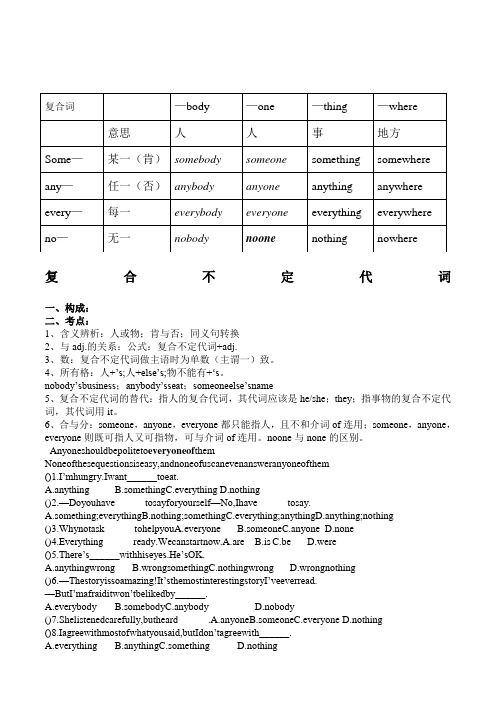
复合不定代词一、构成:二、考点:1、含义辨析:人或物;肯与否;同义句转换2、与adj.的关系:公式:复合不定代词+adj.3、数:复合不定代词做主语时为单数(主谓一)致。
4、所有格:人+’s;人+else’s;物不能有+‘s。
nobody’sbusiness;anybody’sseat;someoneelse’sname5、复合不定代词的替代:指人的复合代词,其代词应该是he/she;they;指事物的复合不定代词,其代词用it。
6、合与分:someone,anyone,everyone都只能指人,且不和介词of连用;someone,anyone,everyone则既可指人又可指物,可与介词of连用。
noone与none的区别。
Anyoneshouldbepoliteto everyoneof themNoneofthesequestionsiseasy,andnoneofuscanevenansweranyoneofthem()1.I’mhungry.Iwant______toeat.A.anythingB.somethingC.everythingD.nothing()2.—Doyouhave______tosayforyourself—No,Ihave______tosay.A.something;everythingB.nothing;somethingC.everything;anythingD.anything;nothing()3.Whynotask______tohelpyouA.everyone B.someoneC.anyone D.none()4.Everything______ready.Wecanstartnow.A.are B.is C.be D.were()5.There’s______withhiseyes.He’sOK.A.anythingwrongB.wrongsomethingC.nothingwrongD.wrongnothing()6.—Thestoryissoamazing!It’sthemostinterestingstoryI’veeverread.—ButI’mafraiditwon’tbelikedby______.A.everybodyB.somebodyC.anybodyD.nobody()7.Shelistenedcarefully,butheard______.A.anyoneB.someoneC.everyone D.nothing()8.Iagreewithmostofwhatyousaid,butIdon’tagreewith______.A.everythingB.anythingC.somethingD.nothing()9.—Everyoneisheretoday,______—No,HanMeiisn’there.She’sill.A.isn’titB.isn’theC.aretheyD.isn’tever yone()10.Everythinggoeswell,______A.isitB.isn’titC.dotheyD.doesn’tit参考答案(1到5BDBBC;6到10ADBAD)()1.I’mhungry.Iwant______toeat.A.anythingB.somethingC.everythingD.nothing()2.—Doyouhave______tosayforyourself—No,Ihave______tosay.A.something;everythingB.nothing;somethingC.everything;anythingD.anything;nothing()3.Whynotask______tohelpyouA.everyoneB.someoneC.anyoneD.none()4.Everything______ready.Wecanstartnow.A.areB.isC.beD.were()5.There’s______withhiseyes.He’sOK.A.anythingwrongB.wrongsomethingC.nothingwrongD.wrongnothing()6.—Thestoryissoamazing!It’sthemostinterestingstoryI’veeverread.—ButI’mafraiditwon’tbelikedby______.A.everybodyB.somebodyC.anybodyD.nobody()7.Shelistenedcarefully,butheard______.A.anyoneB.someoneC.everyoneD.nothing()8.Iagreewithmostofwhatyousaid,butIdon’tagreewith______.A.everythingB.anythingC.somethingD.nothing()9.—Everyoneisheretoday,______—No,HanMeiisn’there.She’sill.A.isn’titB.isn’theC.aretheyD.isn’teveryone()10.Everythinggoeswell,______A.isitB.isn’titC.dotheyD.doesn’tit答案:1B2D3B4B5C6A7D8A9B10D注解:1,用于肯定句或语气委婉的句子,意思是”一些东西”2,含any-的一般用于疑问句、否定句或条件句中.意为”一些东西”.而且,后面有否定词,那肯定是”一无所有或啥都没有”才能相互对应.3,any-通常放在疑问句或否定句中,作为”一些人或任何人”讲.但此处需要”某人或某些人”.4,作为事物的复合不定代词若用作主语,其谓语动词只能用单数.5,wrong作为定语放在复合不定代词即被修饰词之后.另外,nothing与OK相互照应.6,not…everything是否定,,意思是“尽管我喜欢它,可它恐怕不被每个人所喜欢”.7,表示否定,跟前面正好相互照应.8,not…everything是否定,意思是“我并不同意你所讲的一切”.9,指人的复合不定代词若用作主语,谓语动词只能用单数形式,相应的人称代词也只能用he 或she,而并不是用they.10,指事物的复合不定代词若用作主语,谓语动词只能用单数形式,相应的人称代词也只能用it,而并不是用they复习巩固练习题一.单项选择题1.Therewas_________________wrongwithmybike,soIwenttoschoolonfootyesterday.A.anythingB.somethingC.somebodyD.everything2.---Doyouknow_______________aboutthatboy----Sorry,Idon’tknow.A.anythingB.somethingC.somebodyD.everybodyisnice.Everydayshetriedtocook___________formeduringmystayinCanada.A.somethingdifferentB.anythingdifferentC.differentsomethingD.nothingdifferent4.---Doyouhave_____________elsetosayforyourmistake----____________butsorry.A.anything,SomethingB.something,EverythingC.somethingAnythingD.anything,Nothing5.You’dbetternotreadtoday’snewspaperbecausethereis__________init.A.nothingspecialB.anythingnewC.somethinginterestingD.everythingimportant6.---Whatelsedoyouneedforyourtrip---____________else.I’vepackedeverything.A.SomethingB.EverythingC.Nothing7.”Yourtea,please.”“Theremustbe_________inthetea.Ilikethiskindofteawithsugar.A.nothingsweetB.somethingsweetC.sweetsomethingD.sweetnothing8.Isthere______________intoday’snewspaper-----No,nothing.A.anythingimportantB.somethingimportantC.importantanythingD.importantsomething二.选词填空anythingeverything,nothingeveryonenooneDearBill,HowwasyourvacationDidyoudo___________interestingDid_______________inthefamilygowithyou Iwenttoafriend’sfarminthecountrysidewithmyfamily.___________wasgreat.Wefedsomehensandsawsomebabypigs.Theyweresocute!Theonlyproblemwasthattherewas_____ __________muchtodointheeveningbutread.Still_______________seemedtobebored.Byefornow. anythingeverythingnothinganyoneeveryonenoone1.A:Did____________goonvacationwithyoulastmonthB:Yes,myfamilywenttothecountrysidewithme.2.A:DidyourfamilygotothebeachwithyoulastweekendB:NO.__________________frommyfamilywent,butmyfriendwentwithme.3.A:Ididn’t bringbackanythingfromParis.B:_______________________atallWhynot4.A:Didyoubuy______________intheshoppingcenterB:No,Ididn’t.__________________wasveryexpencive.5.A:HowwasthevolleyballgameyesterdayB:Great!__________________ha。
(完整版)复合不定代词的用法及练习

(完整版)复合不定代词的用法及练习复合不定代词的用法及练1. 介绍复合不定代词是指由两个或更多个词组合在一起构成的代词,用于代表不特定的人或事物。
本文将介绍复合不定代词的用法,并提供练来帮助巩固所学内容。
2. 复合不定代词的用法以下是几种常见的复合不定代词及其用法:2.1. 一些 (some)- 用于表示数量不明确的人或物。
例如:somebody(某人),something(某物)。
somebody(某人),something(某物)。
2.2. 任何 (any)- 用于表示无论哪个、无论哪些。
例如:anybody(任何人),anything(任何物)。
anybody(任何人),anything(任何物)。
2.3. 没有 (no)- 用于表示没有、没有任何。
例如:nobody(没有人),nothing(没有物)。
nobody(没有人),nothing(没有物)。
2.4. 所有 (every)- 用于表示每个、每个人或事物。
例如:everybody(每个人),everything(每个物)。
everybody(每个人),everything(每个物)。
3. 练3.1. 填空练请根据句意,填入适当的复合不定代词。
1. ___ has the right to express their opinion.2. I can't find my keys. I've looked everywhere, but ___ seems to be missing.3. ___ can achieve great things if they work hard.4. ___ in this room is broken. We need to fix it.5. I didn't see ___ at the party. Were they there?答案:1. Everybody2. Something3. Anyone4. Something5. Anybody3.2. 造句练请使用复合不定代词,造出五个句子。
复合不定代词用法和练习 含答案

复合不定代词用法和练习含答案复合不定代词是英语中常用的一种代词形式,由"some"、"any"、"no"、"every"、"one"等词与"thing"、"body"、"where"等词组合而成。
它们可以用来指代不确定的人、事物、地点等,并在句子中承担名词的作用。
本文将介绍复合不定代词的用法,并提供一些练习题供大家练习。
一、复合不定代词的用法1. 不定代词 "some" + 不定代词 "one" = "someone"、"somebody"例句:Someone left their umbrella in the classroom.(有人把伞落在教室里了。
)2. 不定代词 "any" + 不定代词 "one" = "anyone"、"anybody"例句:Did anyone see what happened?(有人看见发生了什么吗?)3. 不定代词 "no" + 不定代词 "one" = "no one"、"nobody"例句:Nobody knows the answer to this question.(没有人知道这个问题的答案。
)4. 不定代词 "every" + 不定代词 "one" = "everyone"、"everybody"例句:Everyone is invited to the party.(每个人都被邀请参加派对。
(word完整版)初中复合不定代词的用法及练习题
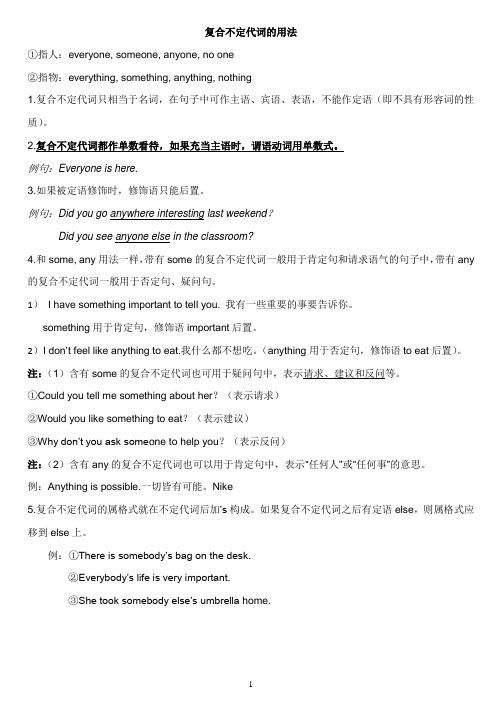
①指人:everyone, someone, anyone, no one②指物:everything, something, anything, nothing1.复合不定代词只相当于名词,在句子中可作主语、宾语、表语,不能作定语(即不具有形容词的性质)。
2.复合不定代词都作单数看待,如果充当主语时,谓语动词用单数式。
例句:Everyone is here.3.如果被定语修饰时,修饰语只能后置。
例句:Did you go anywhere interesting last weekend?Did you see anyone else in the classroom?4.和some, any用法一样,带有some的复合不定代词一般用于肯定句和请求语气的句子中,带有any 的复合不定代词一般用于否定句、疑问句。
1)I have something important to tell you. 我有一些重要的事要告诉你。
something用于肯定句,修饰语important后置。
2)I don’t feel like anything to eat.我什么都不想吃。
(anything用于否定句,修饰语to eat后置)。
注:(1)含有some的复合不定代词也可用于疑问句中,表示请求、建议和反问等。
①Could you tell me something about her?(表示请求)②Would you like something to eat?(表示建议)③Why don’t you ask some one to help you?(表示反问)注:(2)含有any的复合不定代词也可以用于肯定句中,表示“任何人”或“任何事”的意思。
例:Anything is possible.一切皆有可能。
Nike5.复合不定代词的属格式就在不定代词后加’s构成。
如果复合不定代词之后有定语else,则属格式应移到else上。
完整版)复合不定代词练习题及答案
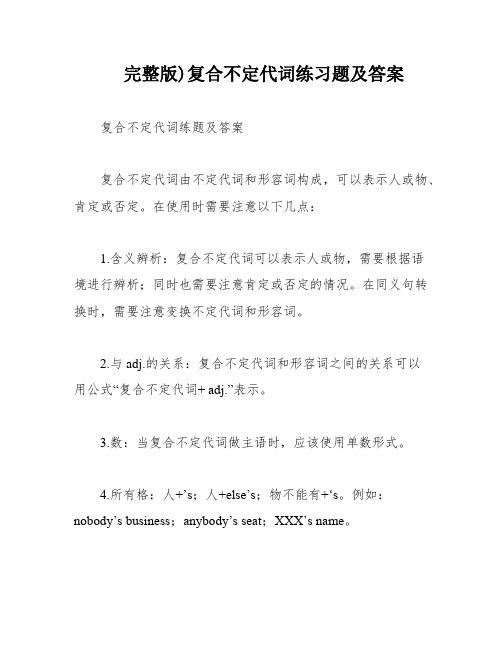
完整版)复合不定代词练习题及答案复合不定代词练题及答案复合不定代词由不定代词和形容词构成,可以表示人或物、肯定或否定。
在使用时需要注意以下几点:1.含义辨析:复合不定代词可以表示人或物,需要根据语境进行辨析;同时也需要注意肯定或否定的情况。
在同义句转换时,需要注意变换不定代词和形容词。
2.与adj.的关系:复合不定代词和形容词之间的关系可以用公式“复合不定代词+ adj.”表示。
3.数:当复合不定代词做主语时,应该使用单数形式。
4.所有格:人+’s;人+else’s;物不能有+‘s。
例如:nobody’s business;anybody’s seat;XXX’s name。
5.复合不定代词的替代:指人的复合代词,其代词应该是he/she或they;指事物的复合不定代词,其代词应该是it。
6.合与分:someone,anyone,everyone只能指人,不与介词of连用;而some one,any one,every one则既可指人又可指物,可以与介词of连用。
no one与none的区别需要注意。
练题:1.我饿了,我想吃点什么。
A。
anything B。
something C。
everything D。
nothing2.“你有什么话要说吗?” “没有,我什么都不想说。
” A。
something。
everything B。
nothing。
something C。
everything。
anything D。
anything。
nothing3.为什么不找某个人来帮你呢。
A。
XXX4.一切准备就绪,我们现在可以开始了。
A。
are B。
is C。
be D。
were5.他的眼睛有问题吗?没有,他没事。
A。
anything wrong B。
wrong something C。
nothing wrong D。
wrong nothing1.There was something wrong with my bike。
(word完整版)初中复合不定代词的用法及练习题

①指人: everyone, someone, anyone, no one②指物: everything, something, anything, nothing1.复合不定代词只相当于名词,在句子中可作主语、宾语、表语,不可以作定语(即不拥有形容词的性质)。
2.复合不定代词都作单数对待,假如充任主语时,谓语动词用单数式。
例句: Everyone is here.3.假如被定语修饰时,修饰语只好后置。
例句: Did you go anywhere interesting last weekend?Did you see anyone else in the classroom?4.和 some, any用法同样,带有some的复合不定代词一般用于一定句和恳求语气的句子中,带有any 的复合不定代词一般用于否认句、疑问句。
1) I have something important to tell you.我有一些重要的事要告诉你。
something用于一定句,修饰语important后置。
2) I don ’tfeel like anything to eat.我什么都不想吃。
(anything用于否认句,修饰语to eat 后置)。
注:( 1)含有 some 的复合不定代词也可用于疑问句中,表示恳求、建讲和反问等。
① Could you tell me something about her?(表示恳求)②Would you like something to eat?(表示建议)③Why don’t you ask some one to help you?(表示反问)注:( 2)含有 any 的复合不定代词也能够用于一定句中,表示“任何人”或“任何事”的意思。
例: Anything is possible.全部皆有可能。
Nike5.复合不定代词的属格式就在不定代词后加’s组成。
假如复合不定代词以后有定语else ,则属格式应移到 else 上。
(完整版)复合不定代词的用法及练习

复合不定代词的用法及练习一.定义:由some, any, no, every力卩上-body,-one,-thing,-where构成的不定代词,叫做复合不定代词.二.分类:1.指人:含-body或-one的复合不定代词指人.2.含-thing的复合不定代词指物。
3.含-where的复合不定代词指地点。
:复合不定代词:somebody =some one某人someth ing某物,某事,某东西somewhere在某处,至U某处an ybody= anyone任何人,无论谁anything 任何事物,无论何事,任何东西any where 在任何地方no body=no one 无一人nothing 无一物,没有任何东西everybody =every one 每人,大家,人人everything 每一个事物,一切everywhere到处,处处,每一处四.复合不定代词用法:(与some和any的区别一样,即some肯定,any否疑)〔特别注意:在would…like sth?can …?句式中,用some不用any〕1.作主语,看作三单,谓语三单(即主三动三)Eg. Somethingis wrong with my watch.Nobody likes him.Every wants to win.Anyone can do it well.2.修饰它们的形容词或不定式一定要位于它们的后面.即(1)复合不定代词+形容词(2)复合不定代词+不定式(to do )Eg.There isnothing wrong with the radi o.这机器没出什么毛病。
Is there anything important in today''s newspaper?今天报纸上有什么重要消息吗?Do you wan t a nythi ng to drin k?你想喝点什么吗?Can you tell something interesting? 你能讲些有趣的事情吗?Would you like something to eat? 要来些吃的东西吗?3、当anything表示“任何事(物),无论何事(物)” anyone, anybody表示“无论谁,任何人”等意义时,它们也可以用于肯定句中。
复合不定代词 讲义+练习(带答案)

复合不定代词复合不定代词anyone, anywhere, something, nothing, someone, everyone 不明确指代任何特定名词或形容词的代词叫不定代词,如:some,any,much,many,both,few 等。
本单元主要学习some,any,every,no 与thing 或one 构成的复合不定代词的含义及其用法。
注意:(1)复合不定代词作主语时,谓语动词常用单数形式。
e.g. Everyone in the village is friendly.(2)复合不定代词若有定语(形容词或动词不定式)修饰时,该定语要至于其后。
e.g. Let’s do something interesting.I’d like something to drink.例题:Ⅰ.用复合不定代词填空1. There isn’t anything new in the white box.2.Tina is doing well in the new school . There’s nothing to worry about.3.Did you go to the farm with anyone?4.Everything in the room looks very tidy and clean .e here! I have something important to tell you.6.Everyone wants to win.Ⅱ.从括号内选择合适的单词完成句子。
7.There isn’t (isn’t /aren’t)anything interesting in the book.8.No one was(were /was) in front of the house.9.Did your cousin buy anything (nothing /anything)in the supermarket?10.Mary didn’t go to the post office with anyone (anyone /someone)last Sunday morning.11.The singer is very great.everyone here knows (know /knows)her.Ⅲ.按要求完成下列句子,每空一词。
复合不定代词的用法及练习

复合不定代词的用法及练习什么是复合不定代词?复合不定代词是由不定代词和介词、副词等组成的一个整体。
它们在句子中起到代词的作用,用来代替不确定的人或物。
常见的复合不定代词有以下几种:1. 不定代词 + of + 不定代词:其中之一、一些。
2. 不定代词 + of + 名词:之中的一部分。
3. 不定代词 + as + 不定代词:作为其中之一。
4. 不定代词 + as + 名词:作为其中的一部分。
复合不定代词的用法复合不定代词通常用来表示人或物的一部分或一个集体,具体用法如下:1. 复合不定代词 + of + 不定代词:- one of + 不定代词:其中之一。
- some of + 不定代词:一些。
- any of + 不定代词:任何一个。
- each of + 不定代词:每一个。
- both of + 不定代词:两者之一。
2. 复合不定代词 + of + 名词:- some of + 名词:其中的一部分。
- many of + 名词:其中的许多。
- most of + 名词:其中的大部分。
3. 复合不定代词 + as + 不定代词:- such as + 不定代词:例如其中之一。
4. 复合不定代词 + as + 名词:- same as + 名词:和其中的一部分一样。
复合不定代词的练请依次将下列句子中的空白处补充完成。
1. He is ___ the happiest person I know.2. ___ the children ate their breakfast.3. The museum has a collection of paintings, and ___ them were created by famous artists.4. In the library, ___ the books are arranged according to their genres.答案:1. one of2. Some of3. many of4. most of5. each of希望以上内容对你有所帮助!如果还有其他问题,请随时提问。
复合不定代词用法和练习(含答案)

复合不定代词用法和练习(含答案)一、复合不定代词的定义和用法复合不定代词由两个或多个词组合形成,用来代替不确定的人或物。
常见的复合不定代词有somebody, somebody, everybody, nobody, something, anything, everything, nothing等。
本节将介绍复合不定代词的具体用法和常见的练习题。
1. 表示肯定和否定复合不定代词在句子中可以代表人或物,并且可以表示肯定或否定的意义。
例如:- Somebody called you yesterday.(有人昨天给你打电话了。
)- Nobody knows the answer.(没有人知道答案。
)- Is there anything I can do for you?(有什么我可以帮你做的吗?)- She doesn't want to do everything by herself.(她不想独自完成所有的事情。
)2. 作主语和宾语复合不定代词可以作为句子的主语或宾语,用来表达不确定的人或物。
例如:- Everybody wants to be successful.(每个人都希望成功。
)- She helped somebody carry the heavy box.(她帮助某人搬运了那个重箱子。
)3. 与不定代词的转换复合不定代词也可以和单个不定代词进行转换,以便在句子中进行替换。
例如:- Everything is under control.(一切都在控制之中。
)→ All is under control.- I didn't see anyone at the party.(我在派对上没有见到任何人。
)→I didn't see anybody at the party.二、复合不定代词的练习题以下是一些关于复合不定代词用法的练习题,答案将在下文给出。
请根据题目选择合适的复合不定代词填空,并理解其在句子中的意义。
完整不定代词的用法讲解及练习题

完整不定代词的用法讲解及练习题1) no表示“没有”,用于肯定句中,修饰可数名词和不可数名词。
There is no milk in the fridge.冰箱里没有牛奶。
No one can deny the XXX.没有人能否认教育的重要性。
2) XXX表示“两者都不”,用于否定句中,修饰两个人或物。
Neither of the ns is XXX.两个选项都不令人满意。
XXX Tom nor Jack is coming to the party.汤姆和XXX都不来参加聚会。
3) none表示“没有一个”,修饰可数名词和不可数名词,用于否定句和疑问句中。
None of the students passed the exam.没有一个学生通过了考试。
None of us knows the answer.我们谁也不知道答案。
No can be used to modify both singular and XXX。
For example。
time and tide wait for no man.XXX of the two ns is correct。
For example。
neither answer is correct.None can be used to indicate that there is not a single person or thing。
and can refer to both countable nouns (when there are more than two people or things) and XXX。
For example。
none of the students failed the XXX.Few means "not many," while a few means "a small number" and is used to modify countable nouns。
复合不定代词考点与强化练习
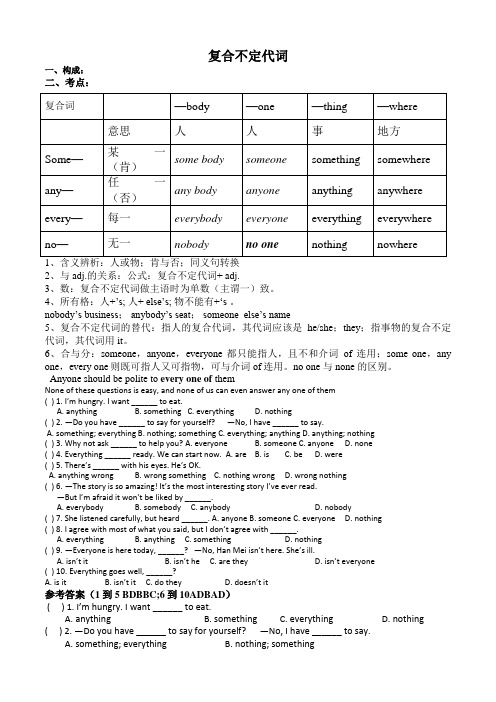
复合不定代词一、构成:二、考点:2、与adj.的关系:公式:复合不定代词+ adj.3、数:复合不定代词做主语时为单数(主谓一)致。
4、所有格:人+’s; 人+ else’s; 物不能有+‘s 。
nobody’s business;anybody’s seat;someone else’s name5、复合不定代词的替代:指人的复合代词,其代词应该是he/she;they;指事物的复合不定代词,其代词用it。
6、合与分:someone,anyone,everyone都只能指人,且不和介词of连用;some one,any one,every one则既可指人又可指物,可与介词of连用。
no one 与none 的区别。
Anyone should be polite to every one of themNone of these questions is easy, and none of us can even answer any one of them( ) 1. I’m hungry. I want ______ to eat.A. anythingB. somethingC. everythingD. nothing( ) 2. —Do you have ______ to say for yourself? —No, I have ______ to say.A. something; everythingB. nothing; somethingC. everything; anythingD. anything; nothing( ) 3. Why not ask ______ to help you? A. everyone B. someone C. anyone D. none( ) 4. Everything ______ ready. We can start now. A. are B. is C. be D. were( ) 5. There’s ______ with his eyes. He’s OK.A. anything wrongB. wrong somethingC. nothing wrongD. wrong nothing( ) 6. —The story is so amazing! It’s the most interesting story I’ve ever read.—But I’m afraid it won’t be liked by ______.A. everybodyB. somebodyC. anybodyD. nobody( ) 7. She listened carefully, but heard ______. A. anyone B. someone C. everyone D. nothing( ) 8. I agree with most of what you said, but I don’t agree with ______.A. everythingB. anythingC. somethingD. nothing( ) 9. —Everyone is here today, ______? —No, Han Mei isn’t here. She’s ill.A. isn’t i tB. isn’t heC. are theyD. isn’t everyone( ) 10. Everything goes well, ______?A. is itB. isn’t itC. do theyD. doesn’t it参考答案(1到5 BDBBC;6到10ADBAD)( ) 1. I’m hungry. I want ______ to eat.A. anythingB. somethingC. everythingD. nothing( ) 2. —Do you have ______ to say for yourself? —No, I have ______ to say.A. something; everythingB. nothing; somethingC. everything; anythingD. anything; nothing( ) 3. Why not ask ______ to help you?A. everyoneB. someoneC. anyoneD. none ( ) 4. Everything ______ ready. We can start now.A. areB. isC. beD. were( ) 5. There’s ______ with his eyes. He’s OK.A. anything wrongB. wrong somethingC. nothing wrongD. wrong nothing( ) 6. —The story is so amazing! It’s the most interesting story I’ve ever read.—But I’m afraid it won’t be liked by ______.A. everybodyB. somebodyC. anybodyD. nobody( ) 7. She listened carefully, but heard ______.A. anyoneB. someoneC. everyoneD. nothing( ) 8. I agree with most of what you said, but I don’t agree with ______.A. everythingB. anythingC. somethingD. nothing( ) 9. —Everyone is here today, ______? —No, Han Mei isn’t here. She’s ill.A. isn’t itB. isn’t heC. are theyD. isn’t everyone( ) 10. Everything goes well, ______?A. is itB. isn’t itC. do theyD. doesn’t it答案:1B 2D 3B 4B 5C 6A 7D 8A 9B 10D注解 :1, 用于肯定句或语气委婉的句子,意思是”一些东西”2, 含any-的一般用于疑问句、否定句或条件句中.意为”一些东西” . 而且,后面有否定词,那肯定是”一无所有或啥都没有”才能相互对应 .3, any-通常放在疑问句或否定句中,作为”一些人或任何人”讲.但此处需要”某人或某些人” .4, 作为事物的复合不定代词若用作主语,其谓语动词只能用单数 .5, wrong作为定语放在复合不定代词即被修饰词之后 .另外,nothing与OK相互照应 .6, not…everything是否定,,意思是“尽管我喜欢它,可它恐怕不被每个人所喜欢” .7, 表示否定,跟前面正好相互照应 .8, not…everything是否定,意思是“我并不同意你所讲的一切” .9, 指人的复合不定代词若用作主语,谓语动词只能用单数形式,相应的人称代词也只能用he或she,而并不是用 they .10, 指事物的复合不定代词若用作主语,谓语动词只能用单数形式,相应的人称代词也只能用 it,而并不是用 they复习巩固练习题一.单项选择题1.There was _________________wrong with my bike,so I went to school on foot yesterday.A. anythingB. somethingC. somebodyD. everything2.---Do you know_______________about that boy? ----Sorry, I don’t know.A. anythingB. somethingC. somebodyD. everybody3.Mrs.Brown is nice. Every day she tried to cook___________for me during my stay in Canada.A. something differentB. anything differentC. different somethingD. nothing different4.---Do you have_____________else to say for your mistake?----____________but sorry.A. anything, SomethingB. something, EverythingC. something AnythingD. anything, Nothing5.You’d better not read today’s newspaper because there is __________in it.A. nothing specialB. anything newC. something interestingD. everything important6.---What else do you need for your trip?---____________else. I’ve packed everything.A. SomethingB. EverythingC. Nothing7.”Your tea, please.” “There must be _________in the tea. I like this kind of tea with sugar.A. nothing sweetB. something sweetC.sweet somethingD. sweet nothing8.Is there ______________in today’s newspaper? -----No, nothing.A. anything importantB. something importantC. important anythingD. important something二.选词填空anything everything, nothing everyone no oneDear Bill,How was your vacation? Did you do ___________interesting? Did _______________in the family go with you? I went to a friend’s farm in the countryside with my family.___________wasgreat. We fed some hens and saw some baby pigs. They were so cute! The only problem was that there was _______________much to do in the evening but read. Still _______________seemed to be bored. Bye for now. anything everything nothing anyone everyone no one1.A:Did ____________go on vacation with you last month?B:Yes, my family went to the countryside with me.2.A: Did your family go to the beach with you last weekend?B:NO.__________________from my family went,but my friend went with me.3.A: I didn’t bring back anything from Paris.B:_______________________at all? Why not?4.A: Did you buy______________in the shopping center?B: No,I didn’t. __________________was very expencive.5.A:How was the volleyball game yesterday?B: Great! __________________ha。
(完整版)复合不定代词用法和练习(含答案).docx

复合不定代词用法和练习复合不定代词的用法:不指明替代某个 (些)人、某个 (些 )事物的代词叫不定代词。
由 some-,any-,no-,every-加上 -one,-body,-thing 连用,构成复合不定代词。
复合不定代词包括something, somebody, someone, anything, anybody, anyone, nothing, nobody, no one, everything, everybody, everyone 等十二个。
这些复合代词具有名词性质,在句中可用作主语、宾语或表语,但不能用作定语。
一、复合不定代词的指代对象1、含-body 和-one 的复合代词只用来指人,含 -body 的复合不定代词与含 -one 的复合不定代词在功能和意义上完全相同,可以互换。
只是用 -body 时显得较通俗些,多用于口语中,用 -one 时显得较文雅些,更常见于正式场合及书面语中。
如:Someone/Somebody is crying in the next room有.人在隔壁房间哭。
2、含 -thing 的复合不定代词只用来指事物。
如:Are you going to buy anything?你会去买东西吗?二、复合不定代词的属格1、含 -one 和 -body 等指人的复合代词可有 -’ s 属格形式。
如:Everybody’s business is nobody’s business大.家的事情没人管。
Is this anybody’ s seat? 这儿有人坐吗?2、含 -one 和 -body 等指人的复合代词后跟else 时, -’s 属格应加在 else 之后。
如:Can you remember someone else’s name? 你还记得其他人的姓名吗?3、含 -thing 等指事物的复合不定代词没有-‘ s 属格形式。
三、复合不定代词的数1、复合不定代词都具有单数的含义,因此通常被看成是单数第三人称。
复合不定代词及练习题
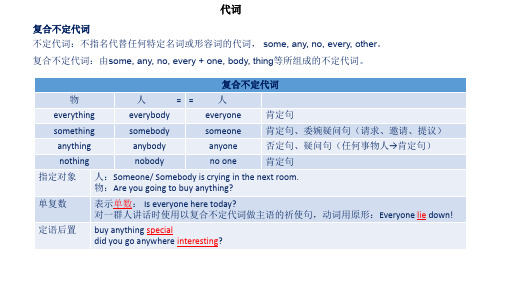
单复数
表示单数: Is everyone here today? 对一群人讲话时使用以复合不定代词做主语的祈使句,动词用原形:Everyone lie down!
定语后置 buy anything special did you go anywhere interesting?
代词
复合不定代词——练习题 2. The boy was so attracted by the computer games that he forgot _____ else. A. anything B. nothing C. something D. everything 3. -What's in the box? - It's empty. There is _____ in it. A. none B. no one C. nothing D. something 3._____is watching TV. Let's turn it off. A. y D. Everybody 4. Can you hear the strange noise from the washing machine?_____ must be wrong with it. A. Anything B. Nothing C. Something 5. I have _____ to do. Please give me _____ to read. A. something, anything B. nothing, something C. nothing, everything D. anything, nothing
代词
代词
代词
复合不定代词 不定代词:不指名代替任何特定名词或形容词的代词, some, any, no, every, other。 复合不定代词:由some, any, no, every + one, body, thing等所组成的不定代词。
Unit 5 语法复合不定代词及习题

Unit 5 语法——复合不定代词Ⅰ.复合不定代词:复合不定代词是指由some,any,no,every分别与one,thing,body等组合而成,具体形式如下ⅠⅠ.用法:1.关于语法成分∶复合代词在句中可作主语、宾语或表语,但不能用作定语。
e.g.Everyone should protect the environment. 人人都应该保护环境。
(主语)e.g.Tom knows nothing about English. 汤姆对英语一窍不通。
(宾语)e.g.That’s nothing. 没什么。
(表语)2.以上复合不定代词(none除外)都表示单数的概念,在句子中作主语、宾语或表语。
作主语时,谓语动词用单数形式,(none即可看作单数也可看作复数);e.g.Someone is asking to see you.e.g.Nobody is absent.3.一般来说:➢当主语是指的复合代词,如时,其反意疑问句后面的主语通常用代词;➢当前面句子中的复合代词指,如时,其反意疑问句后面的主语通常用代词;e.g. is here,aren’t ? 人都到了,是吗?e.g. is ready,isn’t ? 一切准备好了,是吗?4.带有some的复合不定代词一般用于肯定句,带有any的复合不定代词一般用于否定句和疑问句;e.g.Someone suggests putting off the meeting.e.g.Did you meet anyone on your way home.➢当表示请求、建议且希望得到对方肯定回答时,some及some构成的不定代词也可以用在一般疑问句中;➢含有any的复合不定代词也可以用于肯定句中表示“任何人”或“任何事”。
e.g.Why don’t you say something?e.g.Anybody can go.5.someone, anyone, everyone & every one➢someone,anyone,everyone都只能指人,且不和介词of连用;➢some one,any one,every one则既可以指人也可以指物,且可以与介词of 连用。
复合不定代词1
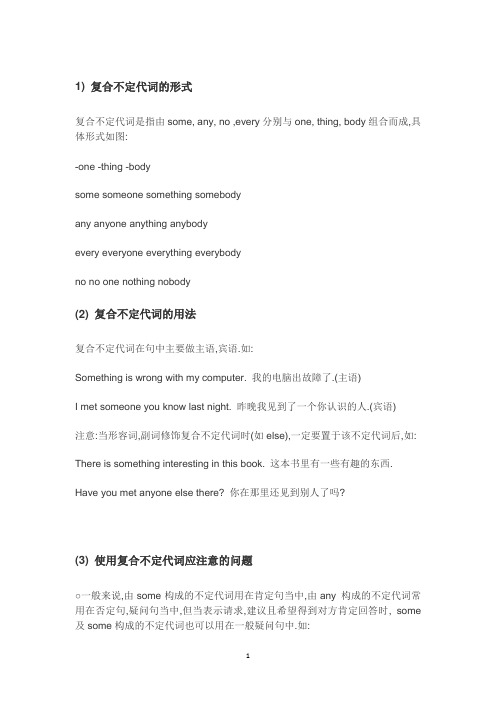
1) 复合不定代词的形式复合不定代词是指由some, any, no ,every分别与one, thing, body组合而成,具体形式如图:-one -thing -bodysome someone something somebodyany anyone anything anybodyevery everyone everything everybodyno no one nothing nobody(2) 复合不定代词的用法复合不定代词在句中主要做主语,宾语.如:Something is wrong with my computer. 我的电脑出故障了.(主语)I met someone you know last night. 昨晚我见到了一个你认识的人.(宾语)注意:当形容词,副词修饰复合不定代词时(如else),一定要置于该不定代词后,如:There is something interesting in this book. 这本书里有一些有趣的东西. Have you met anyone else there? 你在那里还见到别人了吗?(3) 使用复合不定代词应注意的问题○一般来说,由some构成的不定代词用在肯定句当中,由any 构成的不定代词常用在否定句,疑问句当中,但当表示请求,建议且希望得到对方肯定回答时, some 及some构成的不定代词也可以用在一般疑问句中.如:I have something important to tell you. 我有一些重要的事要告诉你.I can’t see anything. 我什么都看不见.There’s nothing I can do. 我什么都做不了.Would you like something to eat? 你想吃些什么吗?Why not ask someone to help you? 你为什么不找人帮你呢?○复合不定代词做句子主语时,谓语动词用单数.如:Nobody knows the answer. 没有任何人知道答案.Someone is knocking at the door. 有人在敲门.anyone意为“任何人,无论是谁“,与anybody一样,只指人不指物,完全没有范围,后面不接of短语everone与everbody一样,只指人,不指物,也不能接of短语,谓语动词用单数no one指没有人,相当于nobody它只指人,不能指物。
- 1、下载文档前请自行甄别文档内容的完整性,平台不提供额外的编辑、内容补充、找答案等附加服务。
- 2、"仅部分预览"的文档,不可在线预览部分如存在完整性等问题,可反馈申请退款(可完整预览的文档不适用该条件!)。
- 3、如文档侵犯您的权益,请联系客服反馈,我们会尽快为您处理(人工客服工作时间:9:00-18:30)。
#
复合不定代词用法和习题练习
复合不定代词是由some-,any-,no-,every-加上-one,-body,-thing等所组成的不定代词。
复合不定代词包括 something, somebody, someone, anything, anybody, anyone, nothing, nobody, no one, everything, everybody, everyone 等十二个。
这些复合代词具有名词性质,在句中可用作主语、宾语或表语,但不能用作定语。
一、复合不定代词的指代对象
1、含-body和-one的复合代词只用来指人,含-body的复合不定代词与含-one的复合不定代词在功能和意义上完全相同,可以互换。
只是用-body时显得较通俗些,多用于口语中,用-one时显得较文雅些,更常见于正式场合及书面语中。
如:
Someone/Somebody is crying in the next room.有人在隔壁房间哭。
2、含-thing的复合不定代词只用来指事物。
如:
Are you going to buy anything你会去买东西吗
二、复合不定代词的数
^
1、复合不定代词都具有单数的含义,因此通常被看成是单数第三人称。
当它们充当句子的主语时,其后的谓语动词用单数形式。
如:
Is everyone here today 今天,大家都到齐了吗
Nothing is difficult if you put your heart into it. 世上无难事,只怕有心人。
三、含some-和any-的复合不定代词间的用法区别
由some-和any-所构成的复合不定代词(即something和anything;someone和anyone;somebody和anybody)之间的区别跟some和any的区别一样。
1、something,someone,somebody通常用于肯定句中,而anything,anyone,anybody 一般用于否定句,疑问句或条件状语从句中。
如:
He found something strange but interesting.他发现了一些奇怪但却有趣的事情。
Do you have anything to say 你有话要说吗
!
I can’t meet anybody on the island. 在岛上,我没遇见任何人。
2、在表示请求、邀请、提建议等带有委婉语气的疑问句,和希望得到对方肯定答复的疑问句,以及表示反问的问句中,也用something,someone,somebody等复合不定代词。
如:Would you like something to eat要些吃的东西吗
3、当anything表示“任何事(物),无论何事(物)”,anyone,anybody表示“无论谁,任何人”等意义时,它们也可以用于肯定句中。
如:
Anything is OK. 什么都行。
Anybody knows the answer.任何人都知道答案。
/
)
练习:
( ) 1. I’m hungry. I want ______ to eat.
A. anything
B. something
C. everything
D. nothing
( ) 2. —Do you have ______ to say for yourself
—No, I have ______ to say.
A. something; everything
B. nothing; something
]
C. everything; anything
D. anything; nothing
( ) 3. Why not ask ______ to help you
A. everyone
B. someone
C. anyone
D. none
( ) 4. Everything ______ ready. We can start now.
A. are
B. is
C. be
D. were
( ) 5. There’s ______ with his eyes. He’s OK.
?
A. anything wrong
B. wrong something
C. nothing wrong
D. wrong nothing
( ) 6. —The story is so amazing! It’s the most interesting story I’ve ever read.
—But I’m afraid it won’t be liked by ______.
A. everybody
B. somebody
C. anybody
D. nobody
( ) 7. She listened carefully, but heard ______.
A. anyone
B. someone
)
C. everyone
D. nothing
( ) 8. I agree with most of what you said, but I don’t agree with ______.
A. everything
B. anything
C. something
D. nothing
( ) 9. —Everyone is here today, ______
—No, Han Mei isn’t here. She’s ill.
A. isn’t it
B. isn’t he
C. are they
D. isn’t everyone
( ) 10. Everything goes well, ______
A. is it
B. isn’t it
C. do they
D. doesn’t it。
